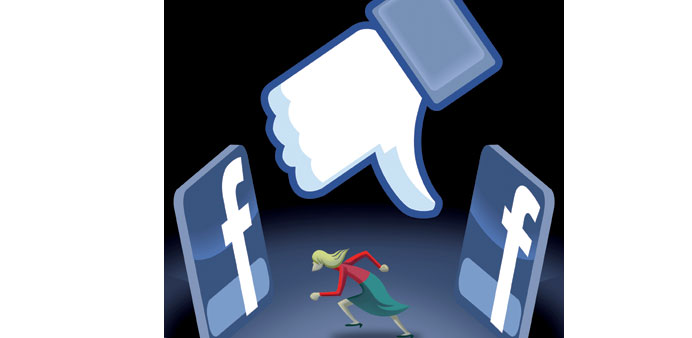By Geoffrey Mohan
Don’t press the like button: Facebook is a bummer that makes us feel worse about our lives, according to new research.
Facebook users in a study led by the University of Michigan wound up feeling worse about themselves after two weeks, and their moment-to-moment mood darkened the more they browsed the social medium.
It didn’t seem to matter how big their network was, how supportive they thought their friends were, nor why they went to Facebook in the first place, according to the study published online in ‘PLOS One’.
“We were able to show on a moment-to-moment basis throughout the day how people’s mood fluctuated depending on their Facebook usage,” said University of Michigan social psychologist Ethan Kross, lead author of the study.
“We measured lots and lots of other personality and behavioural dimensions, like, for example, frequency of Facebook use,” Kross said. “But none of the factors that we assessed influenced the results. The more you used Facebook, the more your mood dropped.”
The study adds to a body of work examining social media’s effect on well-being, much of it offering mixed diagnoses. Looking at your own profile can be self-affirming, according to a recent study. And a survey of Facebook users suggested that it modestly increased life satisfaction, social trust, civic engagement and political participation.
But other studies have suggested Facebook can evoke envy of others’ activities and profile, leaving users with diminished self-images. Another study suggested that people with low self-esteem don’t reap a benefit from tinkering with their online image, either.
None of those studies, however, followed people over time. The University of Michigan study involved 82 college-aged volunteers — a core demographic among Facebook’s nearly 700 mn active daily users — who answered questionnaires five times a day for 14 days, and rated their well-being at the beginning and end.
Worry did not predict changes in Facebook use, but loneliness did, according to the study. Nonetheless, when researchers controlled for loneliness, the relationship between Facebook use and mood and satisfaction were insignificant, Kross said.
“Loneliness predicted Facebook use, and loneliness also predicted how bad people felt,” Kross said. “But the effect of Facebook on how people felt was independent of loneliness.
“One of the things we don’t know is what aspect of Facebook use is contributing to these results,” Kross said.
“Facebook and online social networks more generally represent a very new way in which human beings are interacting, and we’re really just beginning to scratch the surface as to how exactly these interactions work and how they influence us.”
Catalina Toma, a University of Wisconsin communication researcher who found that Facebook users could increase their self-esteem, said seemingly contradictory findings among studies reflect the complexity of the medium and point out the need to drill deeper into what people do while on Facebook.
“I think what’s happening, honestly, is that Facebook is such a gigantic space where so many different activities take place,” said Toma, who was not involved in the study. “So for us to be simply talking about Facebook use is an oversimplification. Facebook use is not just one thing; it is many, many different things.”
Kross and fellow researchers conducted an exploratory analysis of the data that suggests a linear relationship between online communication and face-to-face interaction. As both increase, feelings of well-being decline.
“The negative effect of Facebook use on happiness became more pronounced the more you interacted with other people within that time frame,” Kross said. “It’s very likely that there are going to be a multitude of mechanisms that explain this effect.”
Like other social media, Facebook affords people the opportunity to contemplate, edit and enhance their presentation in ways that are difficult if not impossible during impromptu social interactions in the flesh. You can take hours to come up with a clever response, whereas most people have long left the cocktail party when they think of the perfect riposte.
Toma suggested that users’ emotions and sense of worth may be negatively influenced by the discord between tailored online images of others and their unedited view of themselves. “Instead of doing a person-to-person profile, you’re comparing a profile and a person,” Toma said. Studies have shown that users tend to put their best foot forward, both Toma and Kross noted.
Still, other studies indicate that the information in people’s profiles closely matches their actual personality — enough so that researchers could make predictions based only on the person’s “like” preferences. You are what you like, in other words.
Whether any of this will make you feel better, however, may depend on whether you’re reading this on Facebook. — Los Angeles Times/MCT

